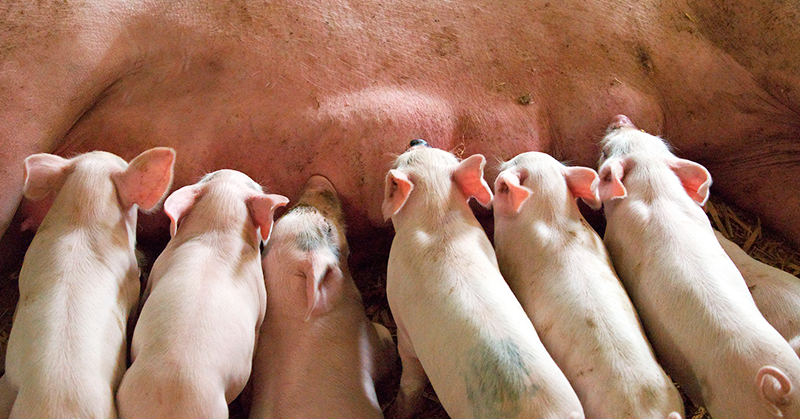How to cope with this critical step for young piglets?
Weaning period is one of the most important stages in the pig life. In most of conventional farms, pigs are usually weaned between 21 and 28 days of age but it can sometimes even occur earlier. This is a critical step for young piglet that requires a strong ability of adaptation. The separation with the mother (loss of contact, milk and the mother’s bacterial environment), the modification of the environment, the transport to another room or building, the mixing of litters, the transition from milk to creep feed, are all stress factors that will negatively impact animal health. In post weaning stage piglets face several great challenges related to an immature digestive system and an immature immune system.
Digestive system
At weaning, piglets are exposed to different factors inducing a poor nutriment and energy assimilation, as well as an intestinal physiology and intestinal flora disbalance. Feed transition from milk to solid feed can lead to a fasting period some days after weaning. Due to the disruption of intestinal flora cause a poor digestion of the nutrients, and an increase of the risk of digestive infections.
At 21 days old the digestive organs are immature, and the main stomachal intestinal and pancreatic enzymes are not yet secreted normally. These changes lead to consequences on the intestinal morphology of the piglet: a decrease in intestinal villosity height, a reduced activity of digestive enzymes and a degradation of the protective mucus layer.

At last, these factors disrupt the commensal gut flora and favor the development of pathogens populations at the origin of diarrhea during the post weaning period. This is the reason why it is important to protect the intestinal epithelium by stimulating the production of mucin in the gut. Intestinal mucins are large glycoproteins secreted by the goblet cells in the intestine. They constitute the mucus gel that coats the intestinal epithelium and protects it. The mucus layer prevents the attachment and colonization of pathogens on the mucosa and limits the intestinal absorption of toxins. Therefore, stimulating the production of mucin to protect the intestine turns out to be a relevant strategy to support intestinal development of young piglets and to prevent digestive disorders.
From this, Olmix has developed a full range of products to support digestive welfare in animals, relying on its MSP®MUCIN, which stimulates the production of mucin by goblet cells and so reinforces the intestinal mucus layer (Figure 1).
The MSP®MUCIN is incorporated in many different products working on the digestive welfare: SeaGut®Paste to manage neonatal diarrhea in piglet, Ecopiglet® & SeaGut®Powder to improve the development of the intestinal tract, SeaLyt®Spark to protect the digestive system and one new product: SeaBiotaTM to combat digestive disorders after weaning.

Figure 1.

SeaBiotaTM was developed to optimize digestive welfare and thus contributes to reduce the harmful effects of digestive disorders on piglets. Its innovative feature resides within the synergy of several effective active ingredients in a unique and combination easy to use (in drinking water via a dosing pump). SeaBiotaTM enables to protect the digestive tract, to promote a balanced gut flora thanks to the use of specific algae extracts (MSP®MUCIN) selected to reinforce the protective intestinal mucus layer and a specific zinc source, issued from a unique Olmix technological process.
The results of a field study carried out in 13 French farms selected for recurrent digestive disorders, showed (with more than 75 batches) that using SeaBiotaTM enables the optimization of intestinal welfare and thus have good management of digestive troubles and a decrease in the use of antibiotics in 75% of cases. In addition, a second study demonstrated that SeaBiotaTM can work as a substitute to the classical use of zinc oxide with a dosage adapted to the farm taking into account the critical periods of piglet’s life. Thus, SeaBiotaTM has proved to be an effective tool for the digestive welfare of weaned piglets experiencing digestive disorders at weaning.
Immune system
The immune system of the piglet after weaning is fragile: the immune protection of the digestive mucosa via the immunoglobulin A (IgA) from the maternal milk is stopped while the active immunity is not yet fully developed. Moreover, at post weaning, piglets face on many stress as weaning, vaccination, grouping, new environmental conditions and feed transition. These changes can be caused an immunodeficiency and increase in the risk of diseases. That is why it is important to improve the innate and adaptative immunity of the piglets during post weaning. The MSP®IMMUNITY present in Searup® reinforce the immune system via an activation of both the innate and adaptative immune system. Searup® can be used to improve the adaptative immune response porcine to circovirus 2 (PCV2).

A Searup® trial conducted in 2017 in Vietnam on piglet weaned at 28 days old and vaccinated for PCV2 at 42 days old, showed a significant reduction in the incidence of respiratory disorders (0.88% vs 2.65%) and a reduction in lameness troubles (0.07% vs 1.29%). Concomitantly antibody homogeneity was improved by 16% at three weeks after vaccination. Different trials carried out around the world using Searup® on piglets, show an improvement in zootechnical performance at weaning. Therefore, Searup® has the capacity to enhance immune system for a better protection of piglets against pathogens.
Conclusion
Engineered from algae and by Olmix technology, algae extracts as MSP®MUCIN and MSP®IMMUNITY prove to be good solution to protect the digestive tract, enhance the immune system to increase zootechnical performance and reduce the use for antibiotics.



